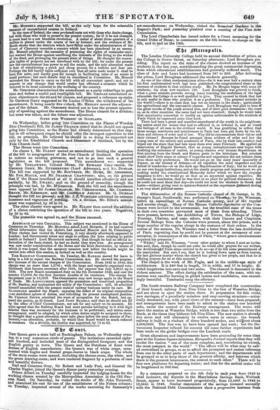trbt glattrop olis.
The London University College held its annual distribution of prizes, at the College in Gower Street, on Saturday afternoon; Lord Brougham presiding. The report on the state of the classes showed an increase of 22 students in the last year, notwithstanding the great commercial depression, from which educational establishments had generally suffered much. The class of Arts and Laws had increased from 187 to 203. After delivering the prizes, Lord Brougham addressed the students generally. . As one of the oldest mathematicians alive—for it was near half a century since his first mathematical work had been published—he congratulated them on the increase of students in that sublime study. Mr. De Morgan began with some 60 students; his class now numbers 120. Lord Brougham was grieved to think, what a great mistake prevails among many touching the usefulness of the legal education the College is so well qualified to give. They seemed to think that law is only useful to those who practise it as a profession. The greatest mistake in the world 1—there is no class that has not an interest in the study; particularly the agricultural and the mercantile classes. Lord Brougham was glad to hear of the great merits of the youth around him, and of their good demeanour; the more so, as in other countries the same had not been observed; though he would take that opportunity somewhat to modify an opinion unfavourable to the students of Paris which he expressed some time back. There had been a great and manifest amendment of the youth in the neighbouring nation amid the scenes that had so afflicted it, so lowered it, and so vexed the feelings of all men in the civilized world. It was gratifying to reflect that those savage murderers and murderesses in Paris had been put down by the soldiers and citizens of order and of law. Why did he commemorate their valour and their virtues? Because he found amongst those soldiers of order and law the young men of the schools and academies of Paris, who by their late conduct had wiped oat the stain that had lain upon them ever since February. He applied an observation of Dugald Stewart, that as young metaphysicians ever began with doubting the existence of matter, so young classics ever became Republicans on first turning from the Greek and Roman poets to the historians. But scholars would show little sense or science if inquiries and experience did not reclaim them from those early preferences. He would not go on the sixty years' insecurity of France, on the history of Athens—of all republics the most imperfect and the fullest of mockeries—or on the dark age Republicanism of Italy; but he would go on our own happy institutions and on the steady progress and improvement we are making under the constitutional Monarchy under which we have the singular happiness to live: he would go on that as an argument against republics. He confessed, in conclusion, that he was then in no place for political discussion; but he could not meet them that day—he could not meet the students in Greek and Latin—without giving vent to opinions founded on the experience gathered during a no very short political career.


























 Previous page
Previous page